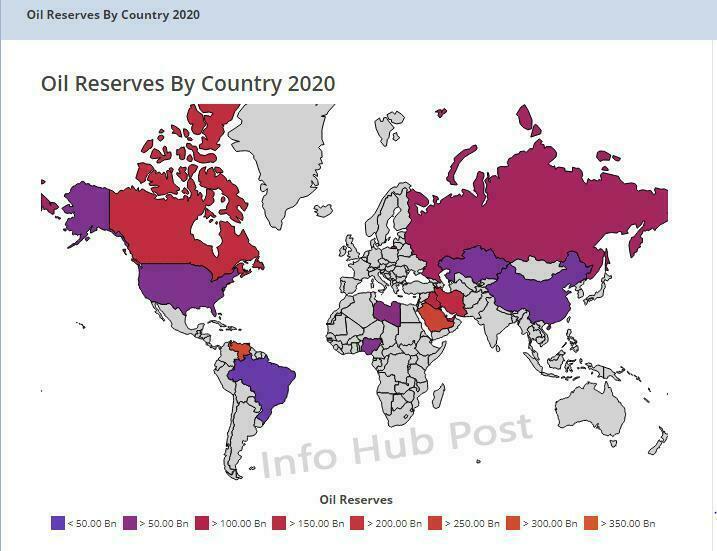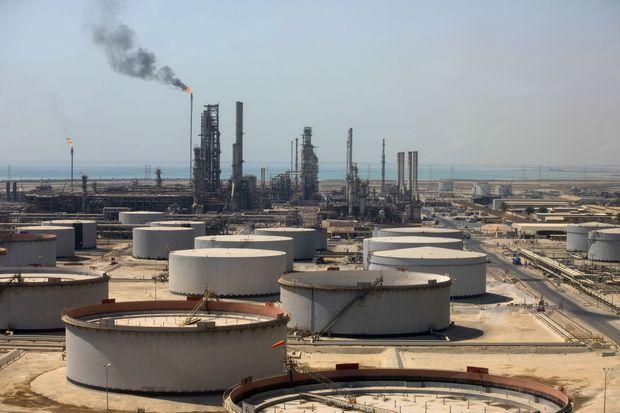Since the emergence of oil industry in mid-nineteenth century, the energy source has offered a bountiful supply of power, triggered wars and reshaped geo-politics with various countries competing to control its supply.
It has been used as fuel for our transport, to generate electricity to light our homes, run factories and machines, as a raw material to produce fertilizer to increase food production and produce plastics used all over the world. which country has the most oil 2022 ?
In 2020, we consumed more oil than any prior year in history – about 101 million barrels per day on a global basis.
World Oil Reserve Map
Here we take a look at the top ten countries with the largest amounts of oil in early 2020.

| Rank | Country | Reserves (millions) |
| 1 | 302,809 | |
| 2 | 267,026 | |
| 3 | 167,896 | |
| 4 | 155,600 | |
| 5 | 145,019 | |
| 6 | 101,500 | |
| 7 | 97,800 | |
| 8 | 80,000 | |
| 9 | 48,363 | |
| 10 | 47,053 | |
| 11 | 36,972 | |
| 12 | 30,000 | |
| 13 | 25,620 | |
| 14 | 25,244 | |
| 15 | 12,999 |
Venezuela tops the list with 300.9 billion barrels of oil in reserve – but even this vast wealth in natural resources has not been enough to save the country from its recent economic and humanitarian crisis.
Saudi Arabia, a country known for its oil dominance, takes the #2 spot with 266.5 billion barrels of oil. Meanwhile, Canada and the U.S. are found at the #3 (169.7 billion bbls) and the #11 (36.5 billion bbls) spots respectively.
Cost of oil production
While having billions of barrels of oil within your borders can be a strategic gift from mother nature, it’s worth mentioning that reserves are just one factor in assessing the potential value of this crucial resource.
In Saudi Arabia, for example, the production cost of oil is roughly $3.00 per barrel, which makes black gold strategic to produce at almost any possible price.
Other countries are not so lucky:
| Country | Production cost (bbl) | Total cost (bbl)* |
|---|---|---|
| United Kingdom | $17.36 | $44.33 |
| Brazil | $9.45 | $34.99 |
| Nigeria | $8.81 | $28.99 |
| Venezuela | $7.94 | $27.62 |
| Canada | $11.56 | $26.64 |
| U.S. shale | $5.85 | $23.35 |
| Norway | $4.24 | $21.31 |
| U.S. non-shale | $5.15 | $20.99 |
| Indonesia | $6.87 | $19.71 |
| Russia | $2.98 | $19.21 |
| Iraq | $2.16 | $10.57 |
| Iran | $1.94 | $9.09 |
| Saudi Arabia | $3.00 | $8.98 |
Even if a country is blessed with some of the most oil reserves in the world, it may not be able to produce and sell that oil to maximize the potential benefit.
Countries like Canada and Venezuela are hindered by geology – in these places, the majority of oil is extra heavy crude or bitumen (oil sands), and these types of oil are simply more difficult and costly to extract.
In other places, obstacles are are self-imposed. In some countries, like Brazil and the U.S., there are higher taxes on oil production, which raises the total cost per barrel.

Hello, I enjoy reading all of your article. I like to write a
little comment to support you.